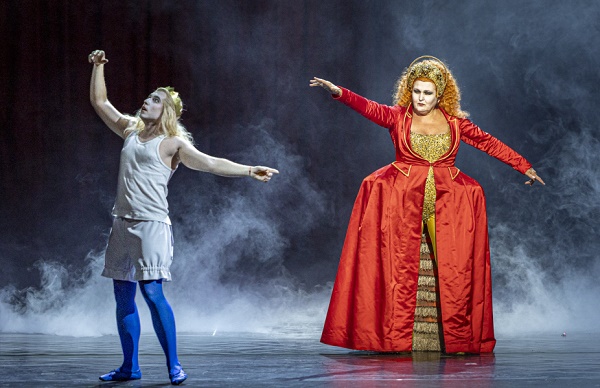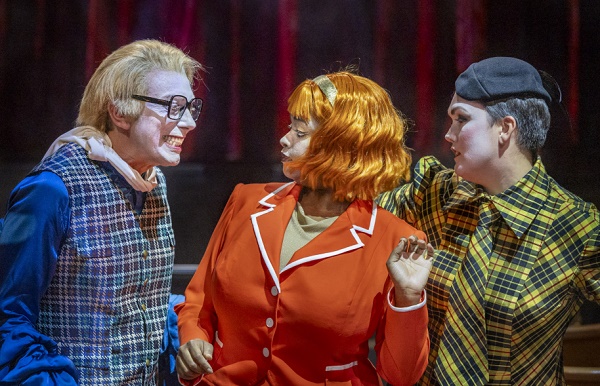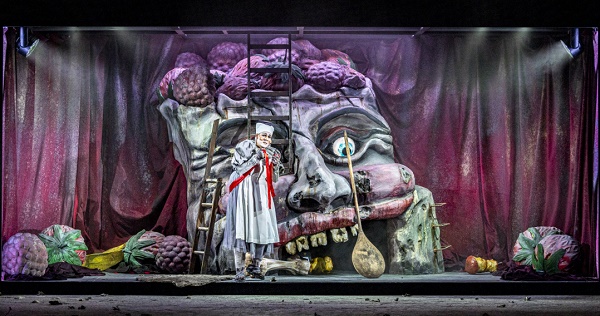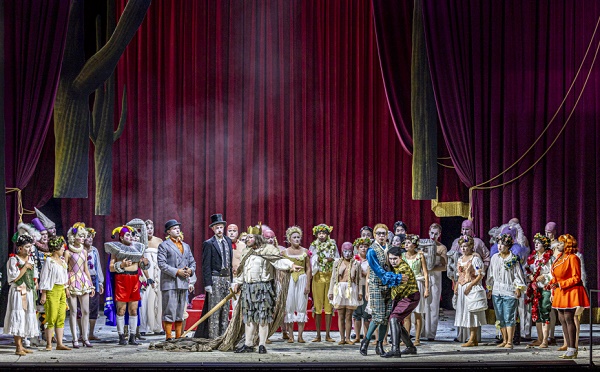Innsbruck: “The Love of Three Oranges” – September 23, 2023 – A magical evening at the opera
Fata Morgana (Agnes Zwirkow) curses Prince (Alexander Fedorov) © Birgit Güfler
Graduation Sergey S. Prokofiev The fantasy opera “The Love of Three Oranges” was heralded as a spectacle – and exceeded all expectations. Yasmina thisziahmetoviC (Director) who worked with Catherine Duda (Dramaturgy) Department of Musical Theater Division Tyrolean State Theater Placed in his hands, he contributes imagination, humour, curious wit and tremendous craftsmanship to the beginning of the new administration Erin Jerkinger It can be described as wonderful.
With Prokofiev’s works, which had premiered in Chicago at the end of 1921 in French (but people in Innsbruck were singing in German), they chose a piece in which almost the entire musical staff could introduce themselves: an ensemble of singers with many new faces, plus The new face Chorus and additional chorus State Theater (rehearsed before Michelle Roberge) and the statisticswhich is used almost non-stop, and of course that Tyrolean Symphony Orchestra Innsbruckled by Matthew Toogood.
Exciters: Erwin Bjelakowicz (Leander), Abongel Fumba (Smeraldina), and Bernarda Klinar (Princess Clarice) © Birgit Goffler
What does this opera offer? As Catherina Duda summarizes in her excellent introductory text, an almost unbelievable mixture of characters: a depressed prince, a king, a clumsy court jester, conspirators, soul-poisoning verses, demons, witches, better and worse sorcerers, hollow-headed people, gluttons, drunkards, rats and sheep, real and fake princesses. And card games, cactus and walking orange. Some of the characters clearly come from the “Commedia dell’arte”, the Italian folk theater that still lives on today in Fasnacht and Carnevale, others are reminiscent of Mozart’s “The Magic Flute” in their characteristics. They were all from Mtilde Feuerstein With a wink at the colourful, detailed and lovingly designed costumes.
What’s more, Prokofiev’s opera, which centers on the heir to the throne who must learn to laugh again and face all kinds of dangers while being fought by evil forces and supported by benevolent spirits, is also theater about theater. In the beginning, different groups negotiate which piece to play, and the choir is not just an additional audience, but also an audience that actively intervenes in the work.
What could be more meaningful than using audience space as a stage? Jasmina Hadji Ahmetovic implements this idea with the greatest consistency. The opera begins with an overture-like performance by a wind ensemble Tyrolean State Conservatory Accompanied dance performance (choreography: Marcel Lehmann), who skillfully directs the audience into the Big House hall, and before the curtain rises, the show has already begun, right in the middle of the stalls. The king, accompanied by all sorts of servants, laments his son’s condition and sometimes cries on the shoulder of a spectator. Confetti and confetti fly through the air and get stuck in some visitors’ hair. The match is played everywhere, including the stands, and in the first part, heroes appear from all sides and from all directions. The effect is powerful, because on the one hand, the actors are singing in close proximity, and on the other hand, you can feel how much they enjoy being close to the audience and even allowing themselves to be carried away by the improvised acting.
Oliver Sailer as the evil cook © Birgit Goffler
The theater itself is rich with connections and imaginatively designed Paul Zoller And Laureana Casagrande, masterfully alternating between powerful simplicity and fairy-tale-like expansiveness. Two folding stage chairs – obviously – form the throne, in the narrow right fire, the conniving couple (lustfully) escape from unsavory plans, but then the prince and the court jester disappear into the vastness of the cactus-filled desert. The witch-like “cook” kitchen cave that is outside, it is an ugly, crushed skull. But the theater is also the place for transitions with vaudeville-like dance numbers. You admire the smoothness of the operations and the constant flashing depth of the fun, which never turns into pure slapstick.
A word about Prokofiev’s music: It is sublime, characterized by captivating rhythms and a palette of exquisitely blended rhythms, unique in its combination of expressivity, richness of dissonance and impressionistic lyricism. Although the oratorical style is dominated by a tendency to obvious, even bizarre images, the strange march-like leitmotif creeps into the mind, becoming a catchy tune and, finally, with a determined final applause, a number of enthusiastic applause from the audience. The Tyrolean Symphony Orchestra in Innsbruck, conducted by Matthew Toogood, has a firm grip on the score, plays engagingly, and when the signal becomes “blurry,” it is the conductor himself who whistles the music! It can be said that the concept of spontaneity and improvisation is contagious.
Anyone who becomes an opera singer is also a “rampant” and excels in front of an audience. And those who are allowed to look not at the dazzling headlights while singing, but rather at the astonished faces, believe they have their finger on the pulse of art education. In this regard, outstanding lyrical and acting achievements can also be explained by the joy observed in performance. Johannes Maria Wimmer He is a perfect king, with a powerful voice and a huge bass that explores the aspects of his role beautifully and precisely. This also applies to the tenor, which shines through all the records Alexander Fedorov, who as a prince has a cross-over audience on his side. The mezzo-soprano, a skilled performer, stands alongside the villains Bernarda Klinar She plays the power-hungry Princess Clarice, who has amazing acting and vocal skills Erwin Bilakowich As conspirator Leander W Agnes Zwirkow As a sophisticated and expressive sorceress Fata Morgana. The soprano, who plays so beautifully, also deserves praise Abogil Fumba Like the fake princess Smeraldina. She belongs to the choir, but she offers a sample of her solo skills here. Oliver Seller With his wonderful baritone voice, he can be seen in three roles: that of the missionary, that of Varfarello, and that of the evil cook.
Court © Birgit Goffler
Good souls are those who sing differently and perform excellently Sasha Zarabi As court jester Truffaldino, Benjamin Chamande Like a delicious wannabe magician and an impressive baritone Nikita Voronchenko Like a pantalone, a type of court master of ceremonies. They die of thirst among the three princesses in the orange Federica Casati And Anastasia Lerman Impressively so early and remains in the brilliance of her radiant and lively voice Anina and buy (Princess Ninetta).
Thomas Nussbaumer

“Travel aficionado. Certified problem solver. Pop culture guru. Typical writer. Entrepreneur. Coffee trailblazer.”











More Stories
Magic Abba – Europe's #1 Music Show Live with the Band
Joseph Hader faces 'turbulence surrounding a peaceful person'
Live streaming platform Kino VOD Club brings focus to Graz